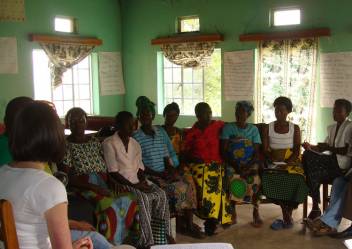 At the beginning of March, the HelpAge HIV team spent a week in Uganda with our partners. The aim was to plan the fifth and final year of our Africa programme funded by the UK Big Lottery Fund to prevent HIV and alleviate its impact in multigenerational households.
At the beginning of March, the HelpAge HIV team spent a week in Uganda with our partners. The aim was to plan the fifth and final year of our Africa programme funded by the UK Big Lottery Fund to prevent HIV and alleviate its impact in multigenerational households.
Still struggling to work out how the last four years have flown by so quickly, we looked at the impact of the programme whilst planning how to make our work supporting older people living with – and affected by – HIV sustainable.
The workshop took place in Uganda, one of the five countries in which the programme is being implemented. We are holding workshops in each of the countries so the whole programme team can visit all the project sites and learn from the different activities and approaches. Uganda is country four out of five…Next stop Tanzania.
Protecting inheritance rights
In Uganda we implement our programme in Kasese, a district in the south-west. The programme addresses the inheritance rights of older people and orphaned and vulnerable children. We visited project sites to see the impact of our work and how the team in Uganda is ensuring its sustainability.
Our first visit was to see a group of paralegals, trained by the project to support multigenerational households and address inheritance disputes. Before the training, the paralegals told us they knew nothing about older people’s rights in relation to inheritance. They even thought that because someone was old, they shouldn’t own property.
Now the paralegals have knowledge of the Ugandan Constitution, particularly articles related to property ownership and inheritance. They have used this to address inheritance disputes faced by older people and instances of domestic violence.
Wills and memory books
Next we visited a group of people living with HIV, the majority of whom were 50 or older. They told us how the paralegals have supported them and what impact the programme has had on their lives.
A key challenge has been people’s reluctance to write wills, as they believe that by doing so you are willing your own death. Through our work, older people now see the importance of having a will and many have written one. Older people noticed that before the programme only men would write a will. Now people realise that women also have things that can be inherited and should prepare accordingly.
Alongside writing wills, older people living with and affected by HIV have been encouraged to produce a memory book. Many told us that working on the book had helped them pass on information about their ancestors, families and friends to the younger generations. They also felt more confident talking about their lives and experiences with each other.
Working through communities
Having seen the positive impacts of the programme, we also wanted to hear about sustainability. One approach has been to ensure paralegals work closely with a range of stakeholders, from the police and local courts, to clan leaders and government officials.
The paralegals told us that their new knowledge had been crucial in ensuring the police’s involvement in disputes. They also played a role in raising awareness of older people’s rights with the police.
Working with clan leaders had also been crucial. As they are widely respected in their communities, many disputes have been overcome without the need for legal intervention. In fact, the local prison warden in one of the villages we visited congratulated the programme for a reduction in crime in the area!
The team also received a boost in Bugoye sub-county. The local government committed to providing funds to support the programme beneficiaries and ensure some of the work continues.
Start of a better response to HIV and older people
This is exactly what we want to see as the programme nears its end. In the final year, we will focus on these kinds of achievements. We will also produce key manuals, tools and publications explaining how we have supported older people.
Our experience from this programme provides crucial evidence that can be used by others working on HIV to ensure their work meets the needs of older people.
This may be the last year of our programme but with the experience we have gained, it can also be the start of a more comprehensive and collaborative response to HIV and older people!
In pictures: Memory books
See how we are tackling the impact of HIV and AIDS in our project scrapbook.
